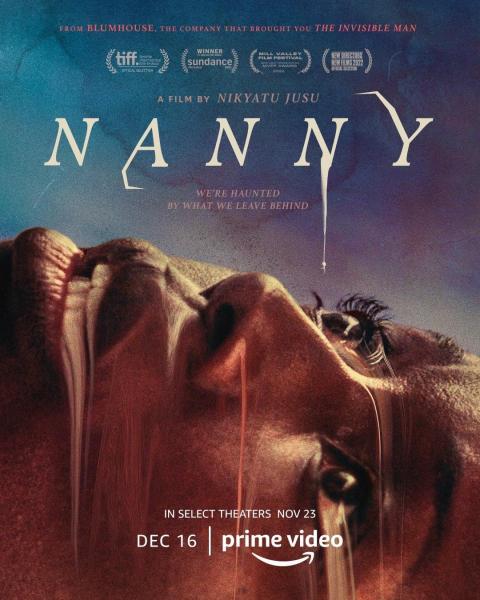The reviews of Daniel Farriol:
nanny
nanny it’s a thriller American dramatic with supernatural touches that is written and directed by Nikyatu Jusu (Two Sentence Horror Stories). The story follows an immigrant nanny who builds a new life for herself in New York City while caring for the son of an Upper East Side family. Little by little, she will be forced to face a hidden truth that threatens to destroy her precarious American dream. It stars Anna Diop (Something About Her, Us), Michelle Monaghan (Restricted area, Duality), Leslie Uggams, Morgan Spector (The Plot Against America, The Fog), Sinqua Walls, Billy Griffith, Zephani Idoko Y Princess Adenika. The film had its international premiere at the sundance festivals 2022 where he won the Grand Jury Prize. In Spain it has been released directly on the platform Amazon Prime Video on December 16, 2022.
Portrait of an African babysitter on the Upper East Side of New York
The winner at Sundance 2022 nanny It is a work that is much more interesting due to its social content than its approach to the fantastic genre where good ideas related to African folklore are pointed out that are later not adequately materialized. The young writer and director Nikyatu Jusu, She makes her feature film debut with a film that follows the thematic trail of her previous short films in which she delved into her cultural roots (she was born in the United States, but her parents are immigrants from Sierra Leone). Almost all of her works tend to look at black women to describe the complexity existing in the relations of immigrants with the North American lifestyle, often with a point of anger that she calls active or passive revolt.
In nanny we have Aisha (Anna Diop), a young Senegalese woman who has immigrated to the United States to have her piece of the American dream cake and finds herself with a much less pleasant reality than expected. Still, she is lucky to find a job as a babysitter taking care of little Rose (Rose Decker), the daughter of a wealthy couple on the New York Upper East Side formed by Amy (Michelle Monaghan) and Adam (Morgan Spector), who almost never meet at home, and from whom he must constantly claim the money they owe him for his work. Everything will get complicated when Aisha begins to suffer strange hallucinations that will lead her to discover a horrible secret related to herself.
Social criticism and myths of African folklore
nanny starts off great. The portrait of the life of the undocumented nanny is accurate and the relationship that she establishes with her employers does not abuse clichés to show the cultural distance and the conflicts that arise between the different ways of approaching the girl’s education. All this part is impregnated with an unsettling sensation where the director introduces folkloric elements that lead the story towards the supernatural. Thus, for example, we see the nanny reading Rose the macabre tale of “Anansi the Spider” or being drawn to some of the photographs hanging in Adam’s office that include images of Wangechi Mutu either nicky woo where the African way of life is portrayed.
Delving into all this, which is quite relevant in the story that unfolds afterwards, the spider Anansi is a mythological character from African popular culture that is often related to the capacity for resistance and survival since the time of slaves and which, today, can be seen as a symbol to overcome social injustices through ingenuity and cunning.
The pictorial and photographic works that appear in the film also have a strong cultural component that derives the vision of the African continent towards the fantastic with works that form a collage of fire, women-mermaids or healing against djinnsnext to that other painting that presides over the room formed with torn book covers that Samuel Levi Jones signs as a symbolic allegation against social inequalities through the destruction of founding books of the culture that sustains the first world.
Exoticism and cultural superiority
It is a pity that such an interesting context of nanny is reduced to some artistic references that will go unnoticed by most and that the script of Nikyatu Jusu prefer to bet on the commonplaces of the subgenre of haunted houses with the Blumhouse stamp (although what really happens is more related to the protagonist than to the house). In the second act, dramatic tension is lost, a romantic subplot is introduced that adds nothing, and occasional references to Mami Wata (Haitian aquatic divinity) or the shamanic spirituality of the marabout (marabouts) become exotic ideas that fail to give cohesion to the story that is being explained to us.
This point is curious because precisely what is criticized in the film is the role of women of African descent as “servants” of white people with high purchasing power who look at them from a cultural superiority that accepts their exoticism (Adam profits from photographs made on the African continent and approaches her in an inappropriate way when trying to kiss her), as long as this does not imply an invasion of her cultural “competences” (the mother cannot stand that her daughter prefers Senegalese food to American food and knows that the husband has a predilection for his nannies).
In short, this soggy vision of the American dream remains somewhat incomplete and outdated (the final dramatic turn that explains the supernatural aspect), failing to achieve the necessary balance between the social and the fantastic, although it did manage to dazzle the jury at the time. of the Sundance Festival in a competition where much superior works were seen such as Palm Tree and Power Lines (Jamie Dack2022) or Blood (Bradley Rust Gray2022).
What do you think of the movie?

